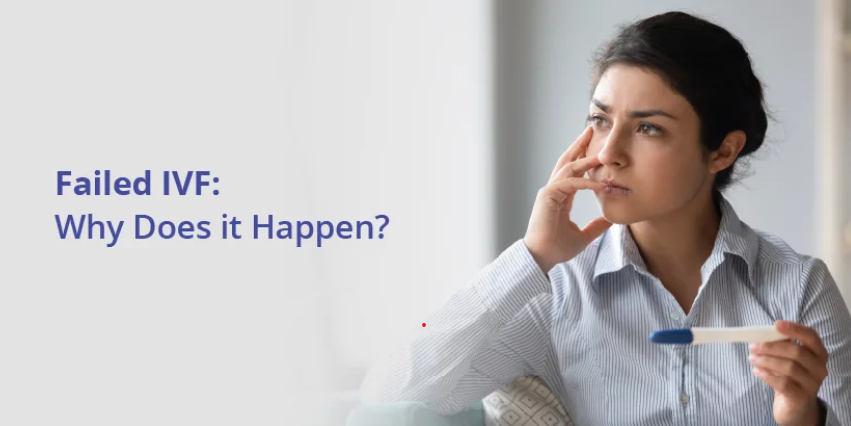Categories
Why Does IVF fail?
May 14, 2024
IVF, or in vitro fertilization, is a process where eggs are taken from a woman's ovaries and fertilized with sperm in a lab. It's a treatment for couples who are struggling to conceive naturally. However, sometimes, even after going through the IVF process, the fertilized eggs don't develop into embryos or the embryos don't implant in the uterus successfully. This is what we call a failed IVF cycle. It can be really disheartening and frustrating for couples who have been through this. But a failed IVF cycle doesn't mean it's the end of the road. Many couples try again, and sometimes they find success in subsequent cycles.
There can be various reasons for why it didn't work ,like:
Poor Egg Quality: Sometimes, the eggs retrieved during the IVF process may not be of optimal quality, which can affect fertilization and embryo development.
Poor Sperm Quality: Similarly, issues with sperm quality, such as low sperm count or motility, can reduce the chances of successful fertilization.
Embryo Quality: Even if fertilization occurs, not all embryos may develop normally. Poor embryo quality can lead to implantation failure or early miscarriage.
Uterine Factors: Problems with the uterus, such as abnormalities in the uterine lining or structure, can hinder embryo implantation.
Hormonal Imbalance: Fluctuations or imbalances in hormone levels can impact the success of IVF treatment, affecting follicle development, egg maturation, and implantation.
Age: Advanced maternal age is associated with decreased ovarian reserve and lower egg quality, which can reduce the likelihood of successful IVF outcomes.
Lifestyle Factors: Certain lifestyle factors, such as smoking, excessive alcohol consumption, obesity, or high stress levels, can negatively impact fertility and IVF success rates.
Genetic Factors: Genetic abnormalities in either partner can affect fertility and may contribute to failed IVF cycles.
Implantation Issues: Even if embryos are of good quality, factors related to implantation, such as embryo-endometrial synchrony, immune factors, or thrombophilias, can affect the success of IVF.
Understanding these potential factors can help doctors tailor treatment plans and strategies to improve the chances of success in subsequent IVF cycles.
Couples may need a thorough evaluation, which may include a physical examination and a review of your medical records and diagnostic tests. Based on the evaluation , the potential reasons for the failed IVF cycle could be pinpointed. A follow-up plan tailored to the individual needs is then outlined which may include scheduling further tests or procedures, adjusting medication protocols, lifestyle modification or arranging for ongoing support services, such as counseling or support groups.
There can be various reasons for why it didn't work ,like:
Poor Egg Quality: Sometimes, the eggs retrieved during the IVF process may not be of optimal quality, which can affect fertilization and embryo development.
Poor Sperm Quality: Similarly, issues with sperm quality, such as low sperm count or motility, can reduce the chances of successful fertilization.
Embryo Quality: Even if fertilization occurs, not all embryos may develop normally. Poor embryo quality can lead to implantation failure or early miscarriage.
Uterine Factors: Problems with the uterus, such as abnormalities in the uterine lining or structure, can hinder embryo implantation.
Hormonal Imbalance: Fluctuations or imbalances in hormone levels can impact the success of IVF treatment, affecting follicle development, egg maturation, and implantation.
Age: Advanced maternal age is associated with decreased ovarian reserve and lower egg quality, which can reduce the likelihood of successful IVF outcomes.
Lifestyle Factors: Certain lifestyle factors, such as smoking, excessive alcohol consumption, obesity, or high stress levels, can negatively impact fertility and IVF success rates.
Genetic Factors: Genetic abnormalities in either partner can affect fertility and may contribute to failed IVF cycles.
Implantation Issues: Even if embryos are of good quality, factors related to implantation, such as embryo-endometrial synchrony, immune factors, or thrombophilias, can affect the success of IVF.
Understanding these potential factors can help doctors tailor treatment plans and strategies to improve the chances of success in subsequent IVF cycles.
Couples may need a thorough evaluation, which may include a physical examination and a review of your medical records and diagnostic tests. Based on the evaluation , the potential reasons for the failed IVF cycle could be pinpointed. A follow-up plan tailored to the individual needs is then outlined which may include scheduling further tests or procedures, adjusting medication protocols, lifestyle modification or arranging for ongoing support services, such as counseling or support groups.











